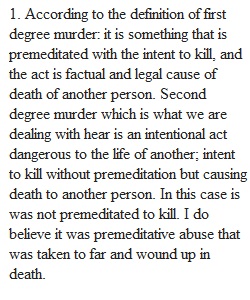


Q Respond to each question. Each question should be answered in a minimum of one paragraph (single spaced). There is NO group discussion this week. In your text read Midgett v. State, 729 S.W.2d 410 (Ark. 1987). Opinion by Newbern, J. and answer the questions following the reading: • Why did the Arkansas Supreme Court rule that Midgett is guilty of second- rather than first-degree murder? Summarize the dissenting view that Midgett killed his son in a premeditated and deliberate manner. • Midgett was charged and convicted of the death of his son inflicted with the purpose of causing serious physical injury. Why was Midgett not charged with knowingly causing the death of another person under circumstances manifesting extreme indifference to the value of human life? For a case involving death resulting from a severe beating of a 19-year-old mentally challenged man by an instructor at a “practical training school,” see People v. Thomas, 272 N.W.2d 157 (Mich. Ct. App. 1978). • Are you confident that judges and juries are able to clearly determine a defendant’s intent from the nature of his criminal acts? Do you agree with the majority or with the dissent? • Based on this case, do you question whether first-degree murder is always a more serious offense than second-degree murder? • One month following the decision in Midgett, the Arkansas legislature amended the state’s criminal code to authorize a verdict of first-degree criminal homicide when an individual under “circumstances manifesting extreme indifference to the value of human life . . . knowingly causes the death of a person fourteen years of age or younger at the time the murder was committed.” See Ark. Code Ann. § 5-10-101(a)(9). Would Midgett be found guilty of first-degree murder under this statute?
View Related Questions